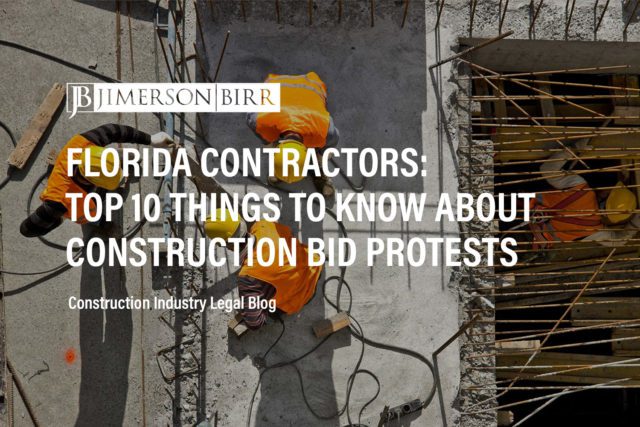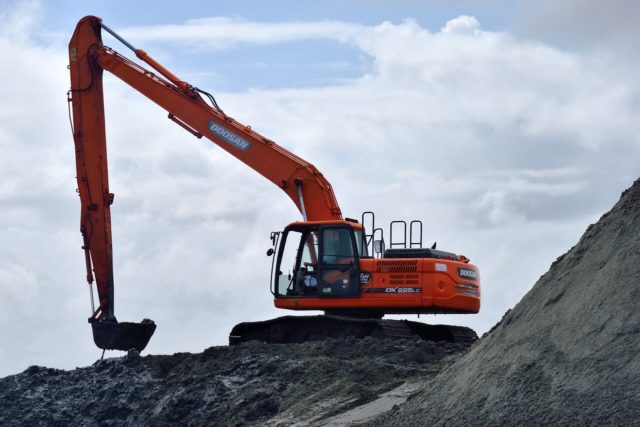What does formulating bid and contract award protests entail, and which laws and rules apply?
Formulating bid and contract award protests involves challenging a government agency’s procurement decision. In Florida, this process falls under Chapter 287 of the Florida Statutes (“Procurement of Personal Property and Services”), the Florida Administrative Procedure Act (FAPA), and the Florida Department of Management Services (DMS) procurement rules.
FAPA outlines the legal framework for challenging a procurement decision, including bid protests. Under FAPA, an affected party may file a bid protest with the procuring agency within 72 hours after posting the notice of the agency’s decision. After the initial protest, an informal resolution process may ensue, but if unresolved, the case proceeds to a formal hearing governed by the Florida Rules of Administrative Procedure.
DMS procurement rules outline the requirements and procedures for state agencies to follow when soliciting and awarding contracts. In addition, these rules guide the procurement process, including the selection of vendors, evaluation criteria, and contract awards. As part of this process, businesses seeking to challenge a procurement decision must carefully review the solicitation documents and adhere to the specific protest procedures outlined therein.
Need help regarding government procurement, including bid and contract protests? Schedule your consultation today with a top government procurement attorney.
How can businesses effectively formulate bid and contract award protests?
Businesses should consider the following steps:
- Review the solicitation documents: Carefully examine the documents, including the request for proposals (RFP) or invitation to bid (ITB), to understand the procurement process and evaluation criteria.
- Identify potential grounds for protest: Determine if there are any procedural errors, inconsistencies, or unfair practices in the procurement process that could serve as the basis for a protest.
- Act promptly: In Florida, bid protests must be filed within 72 hours after posting the notice of the agency’s decision. Failure to meet this deadline may result in the protest dismissal.
- Gather supporting evidence: Collect documentation, witness statements, and other evidence to support the protest. Supporting evidence may include comparing the agency’s evaluation of proposals with the solicitation’s evaluation criteria and identifying any discrepancies.
- Consult with legal counsel: Engage an experienced attorney to help navigate a bid protest’s complex legal and procedural requirements. Legal counsel can help ensure the protest is filed correctly and within the required timeframes.
- Prepare a persuasive protest document: Draft a compelling and well-organized protest document that clearly outlines the grounds for the protest and provides supporting evidence.
What issues regarding formulating bid and contract award protests commonly lead to litigation?
The following issues commonly lead to litigation:
- Ambiguous solicitation language: Unclear or inconsistent terms can lead to disputes, as bidders may interpret the requirements differently. To avoid litigation, contracting officers should ensure that solicitations are clear and unambiguous, following the guidance provided in the Federal Acquisition Regulation (FAR) Part 15.
- Evaluation criteria issues: Disputes may arise when evaluation criteria are not applied consistently or fairly. Contracting officers should adhere to the evaluation criteria outlined in the solicitation, as mandated by the Florida Administrative Code Rule 60A-1.002.
- Procedural errors: Failure to follow required procurement procedures can result in bid protests. Contracting officers should ensure compliance with applicable procurement regulations, including the Florida Statutes Chapter 287 and the FAR.
- Late bids or proposals: Bidders who submit their proposals late may file protests if they believe the deadline was unreasonable or unfairly enforced. Contracting officers should establish clear deadlines and communicate them effectively to all bidders.
When a set of facts is appropriate for litigation, there are many paths a claimant may take. We are value-based attorneys at Jimerson Birr, which means we look at each action with our clients from the point of view of costs and benefits while reducing liability. Then, based on our client’s objectives, we chart a path to seek appropriate remedies.
To determine whether your unique situation may necessitate litigation, please contact our office to set up your initial consultation.
What are effective measures to minimize the litigation risks for formulating bid and contract award protests?
Consider these measures to reduce the risk of litigation:
- Clear Solicitation Language: Drafting unambiguous solicitation documents, including specifications and evaluation criteria, can reduce the risk of misunderstandings and subsequent litigation.
- Strict Adherence to Evaluation Criteria: Evaluating bids and proposals based on the criteria outlined in the solicitation helps ensure fairness and transparency, reducing the likelihood of bid protests and litigation.
- Proactive Communication with Bidders: Maintaining open lines of communication with bidders throughout the procurement process can help address potential issues early on, minimizing the risk of disputes and litigation.
- Timely Debriefings: Providing timely and meaningful debriefings to unsuccessful bidders can help reduce the likelihood of protests by addressing concerns and clarifying the rationale behind the contract award decision.
- Thorough Documentation: Maintaining detailed records of the procurement process, including solicitation documents, evaluation materials, and correspondence with bidders, can provide a strong foundation for defending against bid protests and potential litigation.
- Legal Review: Having procurement documents and processes reviewed by legal counsel can help identify potential issues and ensure compliance with applicable laws and regulations, reducing the risk of litigation.
Please contact our office to set up your initial consultation to see what actions or defenses may be available for your unique situation.
Frequently Asked Questions
- What is the process for filing a bid protest in Florida?
To file a bid protest in Florida, you must follow the guidelines provided by the Florida Administrative Code. You should first file a notice of intent to protest within 72 hours of the agency posting the notice of the decision or intended decision. Then, you must file a formal written protest within ten calendar days after the filing date of the notice of intent to protest.
- Can a bidder protest the terms of a solicitation before the bid submission deadline?
Yes, bidders can protest the terms of a solicitation before the bid submission deadline. According to the Florida Administrative Code, a bidder must file a notice of intent to protest within 72 hours of the posting of the solicitation. In addition, the formal written protest must be filed within ten calendar days after the filing date of the notice of intent to protest.
- What is the difference between a bid protest and a contract award protest?
A bid protest focuses on the terms and conditions of a solicitation or the bidding process. In contrast, a contract award protest challenges the agency’s decision to award a contract to a specific bidder. Both types of protests fall under the Florida Administrative Code Rule 60A-1.006 and the Florida Statutes Chapter 287.
- Are there any alternatives to litigation for resolving bid and contract award protests in Florida?
Alternative dispute resolution (ADR) methods, such as mediation or arbitration, can resolve Florida’s bid and contract award protests. ADR can be a more cost-effective and efficient way to resolve disputes other than litigation. However, it’s essential to consult with an experienced government procurement attorney to determine the most suitable approach for your specific case.
- Can a disappointed bidder recover costs related to bid preparation or protest expenses?
Sometimes, a disappointed bidder may recover bid preparation costs or protest expenses. However, such recovery is limited and depends on the case’s circumstances. Therefore, it’s crucial to consult with an experienced government procurement attorney to determine your eligibility for recovering costs and navigate the complex legal requirements.
Have more questions about a government procurement-related situation?
Crucially, this overview of formulating bid and contract award protests does not begin to cover all the laws implicated by this issue or the factors that may compel the application of such laws. Every case is unique, and the laws can produce different outcomes depending on the individual circumstances.
Jimerson Birr attorneys guide our clients to help make informed decisions while ensuring their rights are respected and protected. Our lawyers are highly trained and experienced in the nuances of the law, so they can accurately interpret statutes and case law and holistically prepare individuals or companies for their legal endeavors. Through this intense personal investment and advocacy, our lawyers will help resolve the issue’s complicated legal problems efficiently and effectively.
Having a Jimerson Birr attorney on your side means securing a team of seasoned, multi-dimensional, cross-functional legal professionals. Whether it is a transaction, an operational issue, a regulatory challenge, or a contested legal predicament that may require court intervention, we remain tireless advocates at every step. Being a value-added law firm means putting the client at the forefront of everything we do. We use our experience to help our clients navigate even the most complex problems and come out the other side triumphant.
If you want to understand your case, the merits of your claim or defense, potential monetary awards, or the amount of exposure you face, you should speak with a qualified Jimerson Birr lawyer. Our experienced team of attorneys is here to help. Call Jimerson Birr at (904) 389-0050 or use the contact form to schedule a consultation.


We live by our 7 Superior Service Commitments
- Conferring Client-Defined Value
- Efficient and Cost-Effective
- Accessibility
- Delivering an Experience While Delivering Results
- Meaningful and Enduring Partnership
- Exceptional Communication Based Upon Listening
- Accountability to Goals











